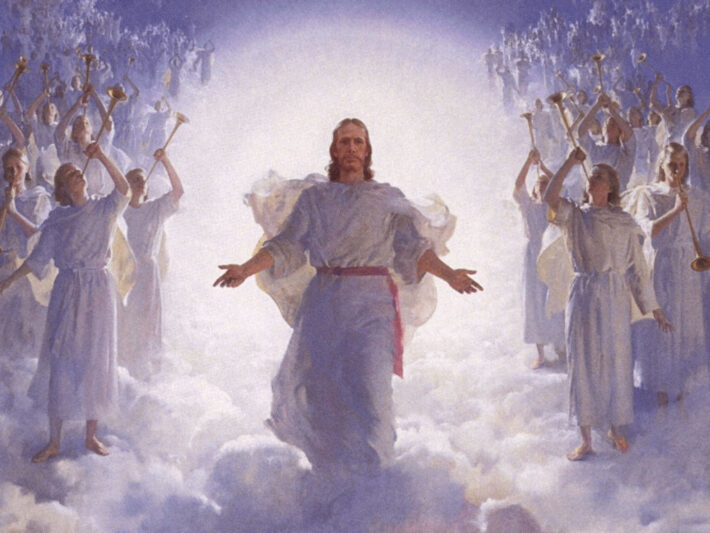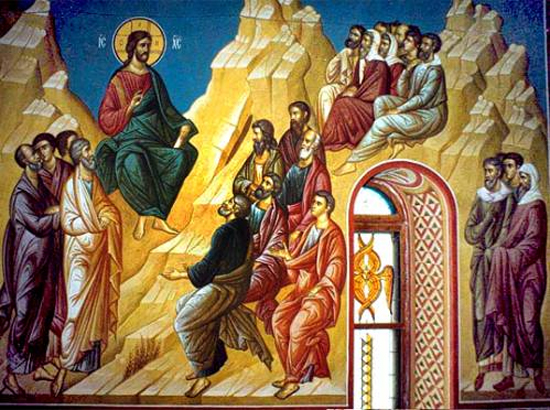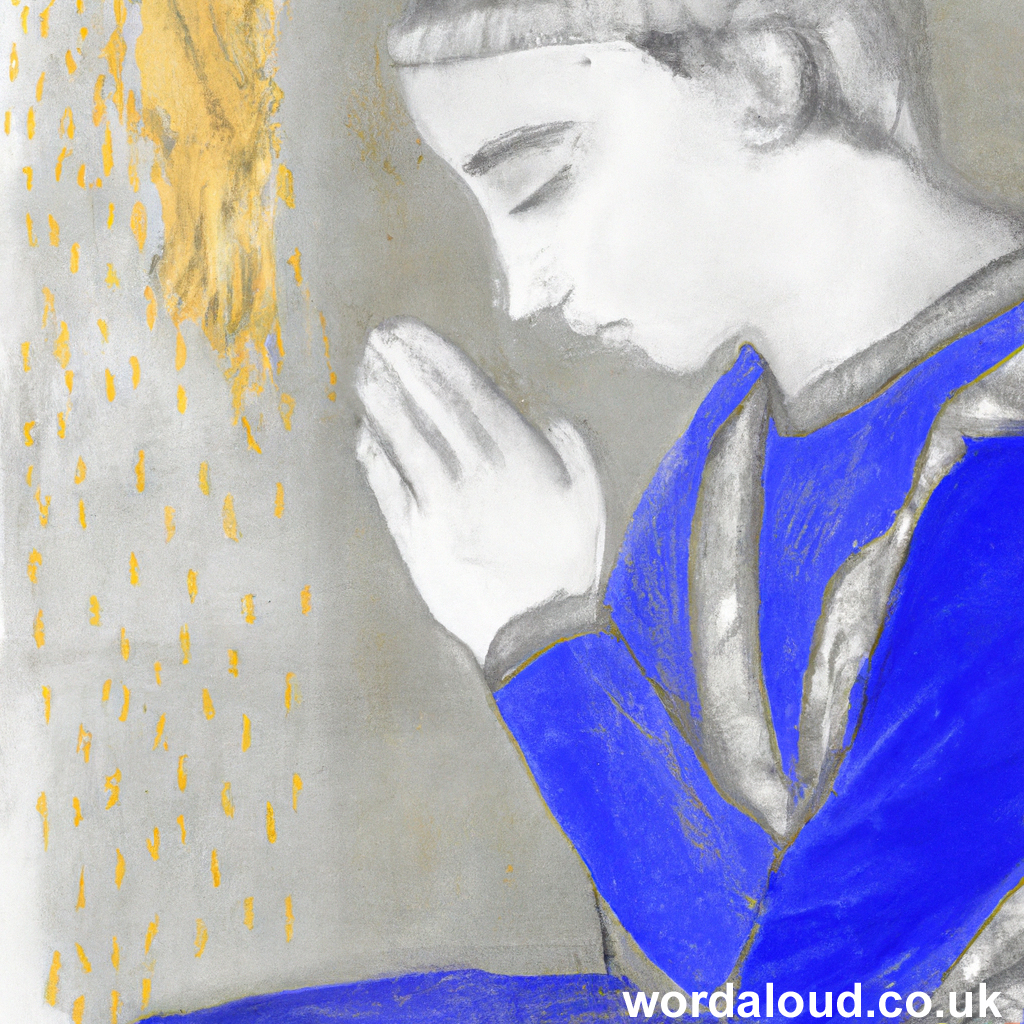Christian Art | Easter To Pentecost
John 16: 5-11 | King James Audio Bible | KJV | King James Version
5 But now I go my way to him that sent me; and none of you asketh me, Whither goest thou?
6 But because I have said these things unto you, sorrow hath filled your heart.
7 Nevertheless I tell you the truth; It is expedient for you that I go away: for if I go not away, the Comforter will not come unto you; but if I depart, I will send him unto you.
8 And when he is come, he will reprove the world of sin, and of righteousness, and of judgment:
9 Of sin, because they believe not on me;
10 Of righteousness, because I go to my Father, and ye see me no more;
11 Of judgment, because the prince of this world is judged.
Jesus continues to teach his disciples, presenting to them the true meaning of his Passion and crucifixion to come, and also consoling the disciples: Jesus tells his disciples that his imminent death on the cross is necessary; it is through the crucifixion that he returns to the Father, and will then send to the disciples the Holy Spirit, the Paraclete, the Counsellor, the Comforter, to be with them forever.
The disciples are confused and saddened by what Jesus has told them about his imminent death. They do not really grasp the fact of Jesus’ heavenly glory, that he sits now, in our time, at the right hand of the Father; what they know is what has been for them the lived reality of Jesus present in their midst as God incarnate, the God-man who has given them the words of life and salvation. Throughout the discourse of the Last Supper, Jesus is careful to explain to them the truth, knowing too that they will only fully come to understand when they receive the Holy Spirit at Pentecost.
In these verses of the Bible, the word ‘world’ is used to refer to those who have not believed in Jesus and who have rejected him, those people who are not with Jesus and therefore are against him, enemies because they choose to remain in sin rather than to accept salvation. Jesus explains that there will be justice. Those people who choose to follow the Evil One, Satan, rather than Christ will be judged.
‘[W]e are united through sharing in the Holy Spirit. If we put aside the natural way of life, and surrender once and for all to the laws of the Spirit, it is incontrovertible that, by denying, in a sense, our own life and assuming the heavenly form of the Holy Spirit so that he becomes woven into our being, we are transformed, so to speak, into another nature. We are no longer just men but sons of God; we receive the name of heavenly men because we are made partakers of the divine nature.’ St Cyril of Alexandria
King James Audio Bible KJV | Endnotes
The Holy Spirit | Paraclete, Counsellor, Comforter
Jesus speaks to his disciples and informs them that he will be leaving them soon. He tells them that they will be sad and sorrowful but assures them that he will send them another advocate, the Holy Spirit, who will guide and comfort them.
The term ‘Paraclete’ comes from the Greek word ‘parakletos’, which means ‘one who is called alongside’. This term is used to describe the Holy Spirit’s role as advocate, intercessor, and helper. The Holy Spirit is the one who comes alongside believers to strengthen and support them, to give wisdom and guidance, and to intercede on their behalf.
The Holy Spirit is also referred to as the ‘Counsellor’, which means one who gives counsel or advice. This term emphasizes the Holy Spirit’s role as a teacher and guide, who helps believers understand God’s will and discern the truth. The Holy Spirit empowers believers to live according to God’s plan and provides them with the strength and wisdom to overcome challenges and difficulties.
And the Holy Spirit is the ‘Comforter’, who brings peace, healing, and solace to believers in times of need. The Holy Spirit’s comfort is not just a surface-level relief but a deep and abiding sense of peace that comes from knowing that God is with us and that he cares for us. The Holy Spirit helps believers to experience God’s love and to draw closer to him in times of difficulty.
Saint Augustine of Hippo emphasized the Holy Spirit’s role as a teacher and guide, who illuminates the scriptures and gives believers understanding. He also spoke of the Holy Spirit’s role as the Comforter, who brings peace and consolation to believers in times of difficulty.
In the Protestant tradition, John Calvin emphasized the Holy Spirit’s role as the Paraclete, who advocates for believers and intercedes on their behalf. Calvin also spoke of the Holy Spirit’s role as the Comforter, who brings peace and joy to believers through the gospel.

The Holy Spirit | The Trinity
As Christians face trials, temptations, and challenges, the Holy Spirit is still the one who advocates for us, guides us, and comforts us. This is because the Holy Spirit is not just a force or power, but a person, with whom we can have a personal relationship.
The Holy Spirit is a source of grace, the unmerited favour of God that enables believers to live a holy life. The Holy Spirit is the one who empowers believers to do good works and to be a witness to the world.
In the Protestant tradition, there is an emphasis on the Holy Spirit’s work in believers’ lives through the process of sanctification. This is the ongoing work of the Holy Spirit to transform believers into the image of Christ. As believers cooperate with the Holy Spirit, we become more like Christ in thoughts, attitudes, and actions.
Spiritual Gifts Of The Holy Spirit
In 1 Corinthians 12, Paul writes about the Holy Spirit’s distribution of spiritual gifts to believers. These gifts include prophecy, healing, speaking in tongues, and interpretation of tongues, among others. The Holy Spirit gives these gifts to believers for the building up of the church and the spread of the gospel.
‘Now there are diversities of gifts, but the same Spirit. And there are differences of administrations, but the same Lord. And there are diversities of operations, but it is the same God which worketh all in all.’ (1 Corinthians 12:4-6)
The Holy Spirit’s role in the church is not limited to individuals’ gifts but extends to the unity and growth of the church as a whole. In Ephesians 4, Paul writes about the Holy Spirit’s work in giving gifts to the church’s leaders, such as apostles, prophets, evangelists, pastors, and teachers, for the purpose of equipping the saints for the work of ministry and building up the body of Christ. The Holy Spirit brings unity to the church and enables believers to work together effectively.
‘And grieve not the Holy Spirit of God, whereby ye are sealed unto the day of redemption. Let all bitterness, and wrath, and anger, and clamour, and evil speaking, be put away from you, with all malice: And be ye kind one to another, tenderhearted, forgiving one another, even as God for Christ’s sake hath forgiven you.’ (Ephesians 4:30-32, KJV)
Furthermore, the Holy Spirit is involved in the process of prayer. In Romans 8:26-27, Paul writes about the Holy Spirit’s intercession for believers in their prayers. When believers do not know what to pray for, the Holy Spirit intercedes for them with groans too deep for words. The Holy Spirit’s intercession is evidence of God’s love and care for believers and provides them with comfort and assurance.
‘Likewise the Spirit also helpeth our infirmities: for we know not what we should pray for as we ought: but the Spirit itself maketh intercession for us with groanings which cannot be uttered. And he that searcheth the hearts knoweth what is the mind of the Spirit, because he maketh intercession for the saints according to the will of God.’ (Romans 8:26-27)
Pope Francis has said and written:
‘The Holy Spirit, the Paraclete, comes to us, and he helps us remember what Jesus has said, and he helps us understand the things of Jesus. He is the divine gift who changes hearts and guides us in our daily lives.’
‘The Holy Spirit is the teacher within us. He leads us, he guides us, he counsels us. He is always with us, walking with us, helping us to discern the will of God.’
‘The Holy Spirit is the great Comforter. He is the one who gives us the strength to carry on when things are difficult. He is the one who gives us hope in the midst of despair, and he is the one who gives us joy in the midst of sadness.’
Pope Francis emphasizes the importance of the Holy Spirit in the life of the Church and encourages believers to be open to his guidance and inspiration:
‘The Holy Spirit is the soul of the Church, and he is the one who guides us as we seek to live out our mission in the world. We need to be open to his presence in our lives, to listen to his voice, and to be willing to follow his guidance, even when it is difficult.’








